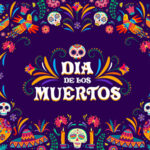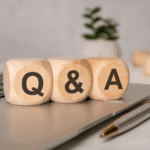One day, a car raced through a yellow light and slammed into Nikki Sian-Leigh Aksamit’s vehicle. She was a mother of two and six weeks pregnant. The trauma of the accident eventually killed her unborn child.

Nikki Sian-Leigh Aksamit lost her unborn child after a car crash and struggled how to tell her kids what had happened. Her book, “Mommy, what is dead” explains death to pre-schoolers. (Image courtesy of Nikki Sian-Leigh Aksamit)
Her two boys wanted to know what had happened to the baby and Nikki struggled for a way to tell them. Finding no children’s book fit for the task, she wrote her own, “Mommy, what is dead?” Digital Dying recently spoke with Nikki on how to talk to children about death.
How did you tell your kids that your unborn child had died?
Rook, my four year-old, knew right away. “Mom, what’s wrong?” he asked. I said, “The baby died.” He said, “What do you mean it died. Why did it have to die?” I said, “The accident caused mommy to lose the baby.” He was just so full of questions. I was at a loss for words. My husband and I answered him the best we could, but I don’t think he got it. Two weeks later, I wrote out questions and what I wanted the pictures to be with a magic marker and construction paper. It probably took a good month and half to finish the book. Then I read it to him. It was just my scribbles, a way to purge myself, but he got it right away.
There were no good children’s books on death?
If you look at children’s books on death or grieving, they are stories. They are all very beautiful magical stories, but they are stories. There is nothing to explain why a body has to die, or something that explains why a baby might have died. If I thought there was something better out there, I would have used that, but I really couldn’t find anything. Everything was cute, fuzzy, bunny fluffy stories.
Can kids really understand death at such a young age?
People find it very hard to be truthful to kids because we think we’re going to hurt them. You don’t want to tell a child a body goes into the ground and gets eaten by bugs. But I tell my kids those things. That’s what they need. It’s because we hide behind death that kids are confused. My kids, at four and six, now understand what death is. They understand that when the dog dies it is in the ground, but they believe in reincarnation, and that her soul has gone on to a new dog. My son has decided that when he dies he wants to be a guinea pig.
How did you first learn about death?
My mom was the starving cat picker upper so I was always surrounded by death while growing up. Mom was really good at explaining why it happened. She also gave us room to do our own thing. She was a single mother and she let me do what I wanted to do and I am so grateful, because it made me so much more world-wise than some of my peers.
Do you see a problem in the way in which American society in general views death?
One of the things I want to convey to the kids is there should always be a fundamental respect for human life. But, there’s not. My son gives me heck because I am a big crime show watcher. He says, “Mom, why do you watch shows about dead people?” I like to watch shows about what would make people’s minds go to that place where they could end a life. It boggles my mind that a person could think that ending a human life could be a response to anything.
I mean, holy crime rate, you can’t turn on the news without a ton of death. My son is four and he is so super-perceptive. So, we don’t have any choice but to tell our kids. Death is important and people dying is important. My son and I just had a conversation about guns and the fact that they can kill people. Death is forever, it’s not like in the cartoons and it’s not like the Xbox 360, you turn off the game and start it over. It’s like a toy, there are certain toys mommy can fix and certain toys she can’t fix. There is only so much crazy glue mommy has.
Nikki’s book, “Mommy, what is dead?” can be purchased on her website. She is working on a series of “What is” books, which will include “Mommy, what is cancer?” and “Mommy, what is autism?”









